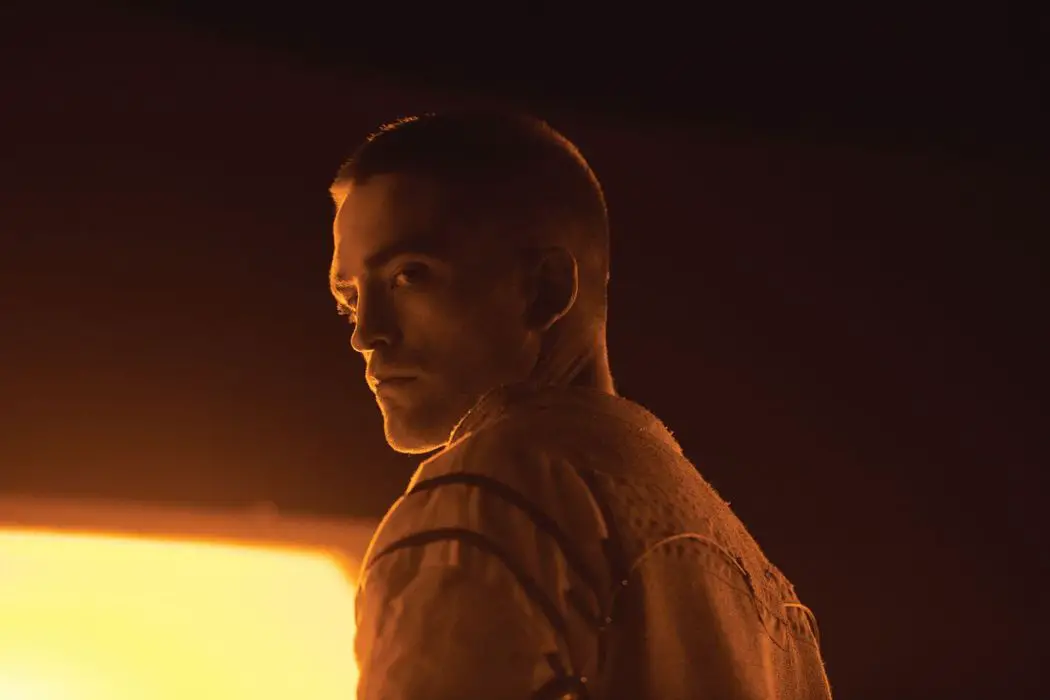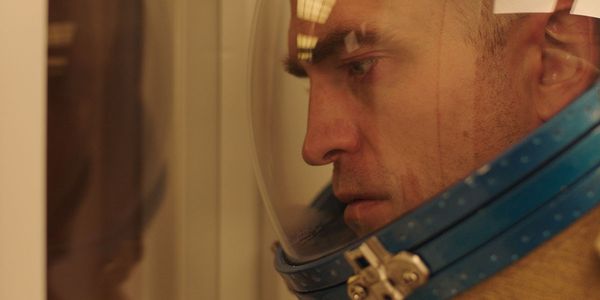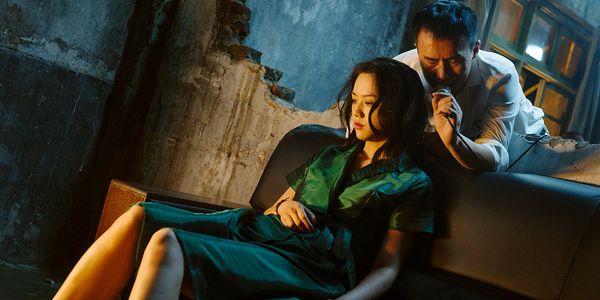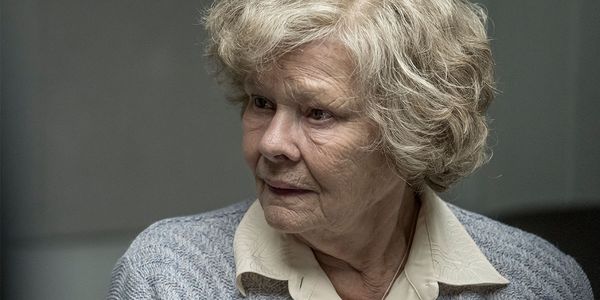Toronto International Film Festival 2018 Report Part 7: Hallo Spaceboys

Tomas is a chronic cineaste who studied English literature in…
This report will be slightly shorter than the others, as I only caught three films on Thursday, September 13th. I would have managed four, only I decided to sleep in and toss the morning screening of David Lowery‘s The Old Man & the Gun. It comes out in a few weeks, guys. Sometimes, it’s better to wait a little longer than show up to screenings looking like a zombie. I’ve seen it with my own eyes, and it ain’t pretty.
High Life (Claire Denis)

The hullabaloo surrounding High Life’s first Gala screening were something to behold. Walkouts en masse. A barrage of angry tweets complaining that the film wasn’t what people were expecting. Whispers of a mysterious “f*ckbox” that Juliette Binoche utilizes, and a scene in which she carries Robert Pattinson’s semen in her hands. I had absolutely no idea what to make of any of this, except to clamp down hard on my Thursday afternoon P&I screening. I had made contingency plans in case High Life was not going to be good, but once all this came to light, I could not be more excited. I basically speed-walked to Scotiabank’s Cinema 13, that’s how anxious I was to see it with my own eyes.
And my oh my, was I not disappointed. Rather than trying to fruitlessly contextualize those controversial scenes that had everyone agog (as they play better without any foreknowledge), I’d rather focus on the humanism that underlies this visionary and unconventional masterwork. It’s not always apparent—there are disturbing scenes of sexual violence that will not sit well with some, as well as a notably alienating bleakness to Claire Denis’ method that has carried over from her other works.
One particular scene that I think captures the film’s tone well is when Pattinson’s character Monte literally hoists up dead bodies from their recumbent positions and ejects them from his space shuttle. The scene possesses a morbid humor that made a few people at my screening laugh, but then it is suddenly brought into stark relief when Denis cuts to their bodies floating peaceably in the black emptiness, like marionettes on strings. Even when Denis preps us to have a chuckle, she is quick to remind us that we’re not going to get a campy cult classic out of her. Her concerns here are not to be taken lightly, and laughter must inevitably give way to serious contemplation.
As the forlorn nature of the scene suggests, High Life contends with ideas of abandonment and belonging when humans can no longer call Earth their home, as well as the ethical implications of scientifically experimenting on those we consider “immoral” or “unsalvageable.” The broad premise here is that a group of criminals are forced to fly out into deep space in order to cultivate an alternative energy source from within a black hole, with the idea that this will be a more effective punishment than mere incarceration. They are a motley lot, and not all of them are likeable.
What’s clear, though, is that they are still living and breathing humans, with fears and hopes and desires separate from the sins they’ve committed. Their fragility, as registered by the bodily fluids they secrete and their inability to acclimate to their new surroundings, renders them vulnerable to numerous indignities, and at the end of the day, Denis shows us that they don’t deserve this cruelty. Especially someone like Monte, who in time is given a daughter (don’t ask how), and whose love for her is unmistakable.
Criminals or not, these characters have the same rights as everyone else, and those rights cannot be trampled on. Not for the sake of science, not for the sake of the law-abiding—not for anything or anyone. As Denis weaves this humanist message into the sparse setpieces, which bathe in lambent teal and orange tones, and the remarkably adroit special effects, which she never overuses, she creates a work that is immediately bold and enduring. A work, moreover, that can sit proudly alongside her other masterpieces, as it offers the same marvelous deployment of sensorial and intellectual bravado that only she knows how to perfect.
Long Day’s Journey into Night (Bi Gan)

Bi Gan is a pretty big deal in some circles. His ambitious first feature, Kaili Blues, was enthusiastically received when it was released a few years ago, and the praise has all but doubled for his sophomore effort, Long Day’s Journey into Night. The man now has two great films under his belt—and he’s only twenty-nine. He’s destined for a big career, and after seeing Long Day’s Journey for myself, I’m excited to know what more he can give us, and how far he can take modern cinema. He seems like someone with the kind of talent and vision to propel it into bold and unexpected territories.
To properly describe Long Day’s Journey would be a vain effort, because it’s not a film that turns on plot as much as it turns on mood. But, for clarity’s sake, I’ll do my best. As with any noir, there is a solitary man down on his luck, named Luo Hongwu (Huang Jue); here, the man returns to his hometown to bury his estranged father, only to discover a mysterious photograph hidden inside one of his father’s clocks. It is of a striking woman he recalls being his long-lost lover, Wan Qiwen (Tang Wei). The question of where she is, and, more importantly, who she is starts Luo on an obsessive journey into his dreams, his subconscious, and, late into the game, our own imaginations.
The thing with this film is, the plot becomes incidental very early on. Like some of the great noirs of the classical era (The Big Sleep, The Third Man, and Kiss Me Deadly, just to name a few), the mystery is almost incidental to the atmosphere the filmmaker wishes to present, whether it be the decay of the aristocratic class, the exhaustion of a battered postwar Europe, or the demented hysteria of the Red Scare. Bi’s chosen atmosphere is a sort of Lynchian “we live inside a dream” incantation, refusing to bend to the wills of reality because the truths we seek may just be the ones that don’t completely exist… at least, not in the world we think we know. Hence why the plot becomes increasingly elliptical and difficult to parse. The hero’s journey has always been inward, into the unknown recesses of memory and the past, and the distorted contours that tend to misshape them.
This idea is augmented in the last act, when Luo heads to a movie theatre to kill time and takes in a 3D picture. When he puts on his glasses, so do we; the title card finally flashes, the 3D stereoscopy kicks in, and we’re launched into what becomes an hour-long single-take that reorients everything that came before. The physical act of adding a new lens to our eyesight—a lens that reconstructs the very depth of reality—becomes a metaphorical act, as well. It is the act of finally confirming the illusory nature of life head on. Rather than interrogating it, we end up seeking new variations on the ambiguities that haunt us, delving into the dreamscapes we once feared would annihilate us. Instead of annihilation, though, there is something approximating serenity.
In that serenity, Luo finds a variation of the woman he lost, as well as a variation of an old friend who, in the other realm, was long dead. In that serenity, a charmed ping pong paddle can lift you off the ground and make you see the world anew. Nothing really changes, and yet, nothing remains the same. The hypnotic quality of Bi’s filmmaking further disorients you until you wonder, when walking out of the theatre, if you had actually seen the film, or merely dreamt it. It slips through you like a spirit, this one. I find that tremendously exciting.
Red Joan (Trevor Nunn)

The opposite of exciting is what I’d call Red Joan. I should have seen it coming, though, to be fair, there was not much else I was interested in seeing Thursday evening, and this did have Judi Dench in it. I have an affinity for Dame Judi, who rarely gives a bad performance, regardless of the film happening around her. I figured, if this British period piece was not going to deliver the goods, at the very least I could watch Judi Dench do her thing. It would be a nice way to round off a day filled with cerebral space odysseys and languid dips into the subconscious mind. You know, partaking in something light after a savory meal. That kind of deal.
It proved to be much less satisfying than I’d hoped. Filmed with a stately conventionality by renowned theatrical director Trevor Nunn, the film offers a fictionalized account of Britain’s longest-serving KGB agent. In real life, she was called Melita Norwood, but Nunn decides to use author Jennie Rooney’s titular novel as his basis, and there the spy is called Joan Stanley. Truthfully, I’m not sure why Nunn couldn’t have done a film directly about Norwood, as the fictional veneer here doesn’t serve much of a purpose, other than to confuse elderly viewers who will be easily led to believe Joan was a real person (and, right enough, one Q&A question seemed to imply the audience member had believed the film’s events had actually happened).
Whether you call her Melita or Joan, though, the film Nunn makes of her life drains it of a lot of its excitement. There are the expected extended flashbacks to her youth as a Cambridge student, where leftist peers soften her patriotic ties, as well as to her time as a top-level physicist during Britain’s efforts to build nuclear weaponry, such as the atomic bomb. Eventually, the guilt she feels at having aided in its creation convinces her to pass on classified documents to the Soviet Union, which are then used to fast track Stalin’s own nuclear efforts. Only in the present-day, when she is in advanced years, is she finally arrested by the British government for treason.
Dench plays the older Joan, and does so with a predictably able hand. She blends together the look of a dainty old lady with the mind of a woman who, even in her golden years, has no regrets for what she has done. One positive thing I can say is that the film does not seek to actively vilify her actions. It does appear to for a while, through Ben Miles’ histrionic performance as Joan’s adult son, but the very fact that his performance is histrionic shows that we can’t take him too seriously. Later we’re told that Joan betrayed her country in order to secure world peace (because, she correctly reasons, two countries with two bombs would bring about an indefinite stalemate), and the logic is so sensible that you can’t help but begrudge Red Joan a little respect for resisting the impulse to make the socialist side unimpeachable wrongdoers.
That still doesn’t make the film very good, for as much as Dench captivates, her role is fairly small. The bulk of the film examines the past, and unfortunately, it’s not given much liveliness. Sophie Cookson’s performance as the younger Joan is certainly the highlight, but she’s also stuck in a lot of musty rooms, with dialogue that makes no effort to be subtle. The whole enterprise thuds along dutifully, and yet only finds sparks of life whenever Dench returns to the fore (the fact that my audience only laughed during Dench’s scenes confirms that I’m not alone in my opinion).
See it for her if you must. Otherwise, maybe reading the book will give you more pleasure, as this adaptation is much too colorless to satisfy even the most enthusiastic of espionage buffs.
Toronto International Film Festival: Next Time
I have five reviews to serve you, as Friday the 14th was the only day I (somehow) managed to squeeze in a quintet of films. Get ready to read about double troubles, moody pen pals, even moodier cops, pro-LGBTQ beehives, and (surprise, surprise) yet another film about a self-destructive singer. Boy, did TIFF overindulge us with those stories this year.
Have you ever been “tricked” into buying tickets to a film that didn’t meet your expectations? Share your stories in the comments below!
The Toronto International Film Festival ran from September 6th to the 16th.
Does content like this matter to you?
Become a Member and support film journalism. Unlock access to all of Film Inquiry`s great articles. Join a community of like-minded readers who are passionate about cinema - get access to our private members Network, give back to independent filmmakers, and more.
Tomas is a chronic cineaste who studied English literature in university (in both the undergraduate and graduate levels), and hopes to pursue a career in writing. His passion for film began in earnest at the beginning of the 2010s, and since then he's been reveling at the vast horizons of the cinematic landscape like a kid at the proverbial candy store.













